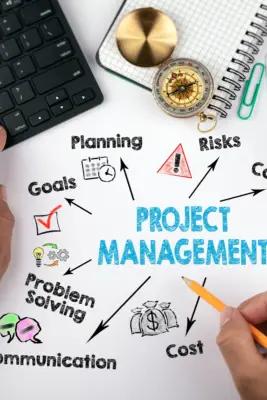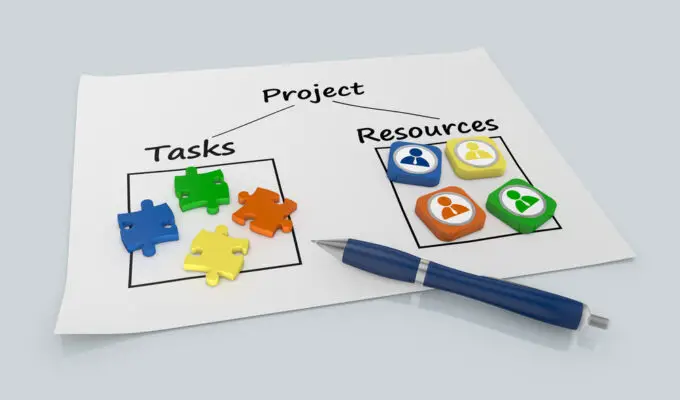Project management is the backbone of every successful business enterprise, transforming a vision into a viable reality. When a concept takes its first breath, the project manager holds the reigns, guiding the process from conception to completion.
From high-stakes decisions to daily operational details, they possess the acumen and agility to orchestrate a diverse range of responsibilities effectively.
This article delves deep into the extensive project management domain, uncovering the vital responsibilities, essential skills, and how the role impacts business outcomes.
Furthermore, it looks at the professional training and certification options available for budding project managers and the future trends reshaping the project management landscape.
The Vital Responsibilities of a Project Manager
You’ve heard the title before. You may even think you know exactly what they do. But do you? The role of a project manager is pivotal, crucial, and indispensable to any organization and demands a unique blend of skills to streamline processes and drive teams toward one common goal effectively. So let’s pull away the curtains on the role to understand truly: what are the core responsibilities of a project manager?
Project managers are the flesh-and-blood infrastructure upon which progress is constructed. They carry the weight of unifying multi-faceted teams, stringing together each individual’s efforts to redefine the unity in “united we stand.” They govern project flow, make strategic decisions, and above all, continuously strive to master their craft at leading.
Planning, the cornerstone of project management, is first on the list. In their endlessly evolving blueprint, project managers identify resources, anticipate risks, and create timelines. Making a plan – and having contingency plans for that plan – thrusts the engine of progress into motion.
Next, you have project execution. A project manager’s role doesn’t end at a desk with a completed project plan. They’re on the field, aiding in task assignments, utilizing resources efficiently, maintaining the quality of project outcomes, and ensuring the momentum of progress doesn’t decelerate.
Then there’s controlling, and no, it’s not about micromanaging. Project managers ascertain project tasks align with the overall goals.
They’re adamant about maintaining the quality of the work done, and they persistently compare the actual and planned progress, steering their teams back to the right path whenever necessary.
Risk management, the lifeblood of any thriving project, cannot be overlooked. Navigating the project landscape with a keen eye for potential pitfalls is the realm of the project manager. By ably forecasting potential problems and effectively mitigating risks, the project manager ensures a smoother path to the project’s end goal.
Last but not least is communication. Those gifted with the responsibility of a project manager are often shown to be masters of communication. They continually liaise, facilitate, and mediate to ensure transparency and clarity within their diverse teams. They maintain a system of trust and a culture of open conversation that fosters innovation and growth.
Understanding the intricacies of a complex project in a volatile market is no small task. It requires adaptability, resilience, and deftness in decision-making.
Project managers do not simply manage; they shepherd their teams, incorporating their strengths and weaknesses into a one-of-a-kind business orchestration that leads organizations to their peak.
Tracing the footsteps of a project manager brings us to the intersection of strategy, foresight, and impassioned leadership. A project manager does not only ‘manage.’ They think, strategize, execute, and, above all, shape the future of the organizations they bolster.

Skills and Competencies of a Successful Project Manager
The Art of Amplifying Project Management: Mastering Key Skills and Competencies
In today’s dynamically evolving business landscape, a project manager’s effectiveness is no longer exclusively hinged on drafting meticulous roadmaps or strictly adhering to deadlines.
Indeed, these remain integral functions of project administration. However, to truly rise above the average and redefine effectiveness, project managers need to hone a wider armamentarium of attributes and abilities.
Firstly, let us highlight the importance of mastering Emotional Intelligence (EI). EI is the ability to understand, regulate, and effectively express one’s emotions while empathetically navigating others’ emotional landscapes.
For project managers overseeing teams with a myriad of personalities, the demonstration of high EI plays an instrumental role in fostering productive relationships, resolving conflicts, and motivating teams not just to hurdle but leap beyond set targets.
Innovation Management is next on the list of pivotal skills for a compelling project manager. Navigating the sea of breakthroughs and disruptive technologies swarming the business horizon, project managers should endorse creative thinking as well as cultivate a keen eye for innovation.
They must be capable of merging abstract ideas with proven strategies to drive the creative process toward transformative outcomes.
Come rain or shine, the captain holds the wheel. The same rings true for project managers who need to build their Resilience and Stress Management skills. Smooth seas never made a skilled sailor, and managing projects is often equivalent to weathering a storm.
Resilience helps project managers push through challenges and setbacks with optimism, while effective stress management abilities prevent burnout, which could negatively affect team performance.
An increasingly crucial skill for project managers in the ‘work from home’ era is Digital Proficiency. In the digitized workspace, adeptness at using up-to-date tools and applications for Project Management Information Systems (PMIS) cannot be sidelined.
Digital proficiency can streamline collaboration, enhance data analysis, and ultimately foster productivity and punctuality.
Lastly, unerring Ethical Judgment and Decision-making skills distinguish exceptional project managers from the rest.
Ethics form the backbone of high-stakes project decisions, where discrepancies can risk the entire organization’s reputation.
Astute moral judgment can offer promising solutions that abide by corporate values and societal expectations while maintaining the project’s financial viability.
The elevation to a new paradigm of project management is not easy. It necessitates a set of unique skills that transcend conventional project administration’s confines.
However, as the business ecosystem morphs, so must project managers to ensure they coexist harmoniously while harnessing the unexploited potential of effective project management.
Although the journey is relentlessly uphill, the fruits it bears are ripe, unparalleled, and, most suitably, trailblazing.

The Impact of a Project Manager on Business Outcomes
The Underrated Influence of Project Managers on Business Success
Project management is about more than just overseeing tasks and meeting deadlines. It’s an intricate balance, a dance of various elements that stem from the epicenter of one dynamic role – the project manager.
The relevance of this role in desired business outcomes cannot be overstated.
It’s imperative to appreciate that a project manager’s skill set isn’t limited to traditional project management methodologies. Some of their less heralded but equally crucial competencies include Emotional Intelligence (EI), Innovation Management, Resilience and Stress Management, Digital Proficiency, and Ethical Judgment and Decision-making.
EI is a key determinant of project success. A project manager with high EI can decode the emotional undercurrents within a team, enhance collaboration, and ensure better conflict resolution.
Further, it also enhances rapport-building with stakeholders, leading to improved communication and smoother project flow.
Then comes Innovation Management, an area where project managers wear the hat of thought leaders. Their capacity to instill a culture of innovation is pivotal in ensuring the incorporation of fresh, effective solutions to meet project challenges.
The resultant products, if duly backed by innovation, can position a business on the better side of competitive advantage.
Resilience and Stress Management is the unseen armor of a project manager in today’s volatile business climate. Despite the twists and turns of a project lifecycle, project managers need to navigate challenges calmly, with the resilience to bounce back from setbacks.
By managing their own stress levels and fostering a balanced team environment, project managers can significantly impact productivity levels, thereby ensuring projects stay on track.
In this digital age, the ability to harness technology to optimize project processes is non-negotiable. A project manager’s Digital Proficiency can influence cost efficiency, timely execution, and even the overall quality of the project outcome.
By leveraging the right project management tools and technology, project managers can streamline workflows, stir collaboration, and enhance project visibility – all key to driving business results.
Finally, the place of Ethical Judgment and Decision-making in the role of a project manager cannot be undervalued. Ethical dilemmas can surface at any juncture in a project’s journey.
A project manager’s ability to make ethical decisions can not only avoid potential roadblocks but also fortify the organization’s reputation.
This integrity seamlessly weaves into nurturing a culture of trust, essential for driving team performance and, ultimately, desirable business outcomes.
There you have it. The value a project manager brings to a business isn’t simply about ‘getting the job done.’ With a multi-faceted role, their influence resonates far beyond project boundaries.
It’s about making strategic decisions, fostering innovation, mastering digital tools, leading with emotional intelligence, and upholding ethics – always with an eye on the bigger picture.
Indeed, a project manager could be the missing link to turn a good business outcome into an extraordinary one. This understanding just might be the critical edge to your organization’s echelons of success.

Training and Certification for Project Managers
Putting a keen focus on the training of project managers is no longer a novel idea but an expectation. Two primary training categories, technical training, and soft skills training, must be at the forefront of your consideration.
Technical training naturally revolves around gaining expertise in key project management methodologies such as Agile, Scrum, Lean, and Waterfall.
Mastery of these demonstrable skills can be signified through internationally recognized credentials like the Project Management Professional (PMP), Agile Certified Practitioner (ACP), and Certified Scrum Master (CSM).
Furthermore, possessing a deep understanding of project management software tools like Microsoft Project, Asana, Trello, etc., is a requisite that must not be undermined.
However, the training repertoire of a project manager cannot be limited to just technical expertise. It has to dive deep into the ocean of soft skills as well.
Harnessing the dynamism of Emotional Intelligence to understand, control, and articulate one’s own emotions, as well as being empathetic towards others, can significantly transform a project manager’s effectiveness.
Moreover, Innovation Management is a game-changer that enables project managers to foster creativity, stimulate innovation, and adapt quickly to the changing market dynamics.
This competence arms project managers with the skills to identify, assess, road map, and strategize business enhancements via innovative ideas.
The ongoing wave of digitalization makes digital proficiency an unavoidable stream of learning. Complementing and supplementing it with a deep sense of Ethical Judgment and Decision-making would further amplify the project manager’s command over projects. It would equip them to handle the project-related ethical issues with absolute integrity.
Surviving in the competitive corporate habitat also demands a fair share of Resilience and Stress Management skills. Dynamically evolving projects can indeed be a rollercoaster ride, and maintaining an optimal level of stress enables project managers to keep their sanity intact.
In a nutshell, focusing exclusively on technical training is like expecting a tree to grow strong with only sunlight and no water. Like sunlight and water, technical and soft skills are key for a project manager’s growth.
So, let’s acknowledge this and tailor the project management training initiatives that not only build technical prowess in project managers but also hone their soft skills to cultivate multi-faceted professionals for the business world. Overlooking either aspect can mean missing the mark on project management excellence.

Project Management in the Future: Trends and Innovations
Emerging at the vanguard of progressive industry trends, Advanced Data Analytics is fundamentally altering the project management landscape.
Continuous real-time data monitoring, predictive modeling, and statistical analysis have transformed how decisions are made, risks are identified, and project outcomes are predicted.
Through advanced analytics, managers are enabled to make data-driven decisions, going beyond the realm of intuition and experience. The objective, data-backed insights engender a more proactive approach to problem-solving and ultimately foster an environment of efficiency and productivity.
Artificial Intelligence (AI) and Machine Learning (ML) are embellishing project management with incalculable benefits. When harnessed correctly, these technologies can automate routine tasks, refine decision-making processes, and even predict project outcomes.
AI eliminates human error, improves accuracy, and boosts efficiency, ultimately saving managers valuable time and resources. Furthermore, Machine Learning algorithms, through repeated iterations and pattern identification, can sift through vast amounts of data to predict project trends and potential risks.
The incorporation of Cloud-based Project Management Tools is another groundbreaking trend. These platforms on the cloud offer a myriad of advantages, such as increased flexibility, easy accessibility, cost-effectiveness, enhanced security, and automatic updates.
Remote teams can connect, collaborate, and work cohesively, despite geographical boundaries. Project information stored on the cloud is presented in a succinct, easily understandable interface, fostering a nimble adaptive pace in rapidly evolving project environments.
In a climate increasingly dominated by remote teams and virtual meetings, the trend of Virtual Reality (VR) and Augmented Reality (AR) is taking the world of project management by storm. From conducting virtual walkthroughs and reviews to providing hands-on training and performance support, these immersive technologies have the potential to elevate interaction and collaboration to unparalleled levels.
VR and AR can foster a highly engaging, collaborative environment, catalyzing project team synergy. Considering the surge in global complexity and uncertainty, organizations are increasingly demanding Social and Environmental Responsibility from project managers.
These managers are expected to seek a balance between economic performance, societal impact, and environmental sustainability. They are being called upon not only to deliver successful projects but also to do so without compromising ethical standards or harming the environment.
This shift towards a more ethically and environmentally conscious project management approach resonates with both clients and stakeholders alike, promoting integrity and accountability within organizations.
Enters the realm of Distributed Project Management, a construct not merely limited to remote team coordination but one where team members are adept at synchronously working while spatially and temporally distributed.
This concept has seen burgeoning popularity amidst the COVID-19 pandemic, and even post-pandemic, it would be safe to presume it continued prospering.
Distributed project teams can leverage diverse talents, improve work-life balance, and open a ripple of cost-saving opportunities. Project management is poised for disruptive change fueled by technological advancements, changing societal norms, and dynamic organizational needs.
The crux here is adaptability and relentless innovation – survival of the most agile. Emerging trends are weaving new narratives, and the future of project management is honing up to be a fascinating journey of continual transformation. Leverage these trends and gear up to create not just successful projects but a successful future.

Conclusion
As we march forward into a technology-driven future, project management continues to evolve, embracing innovative practices and tools.
Agility and adaptability are no longer buzzwords but necessities for the project managers of tomorrow. Regardless of industry, a skilled project manager can bring a transformative difference, enhancing efficiency, reducing cycle times, and significantly boosting stakeholder satisfaction and company reputation.
Therefore, whether you’re stepping into this challenging field or looking to fine-tune your skills as a seasoned professional, understanding project management’s shifting dynamics is an asset that will keep on giving, ensuring sustainable success in an ever-competitive market.

Chris Ekai is a Risk Management expert with over 10 years of experience in the field. He has a Master’s(MSc) degree in Risk Management from University of Portsmouth and is a CPA and Finance professional. He currently works as a Content Manager at Risk Publishing, writing about Enterprise Risk Management, Business Continuity Management and Project Management.

